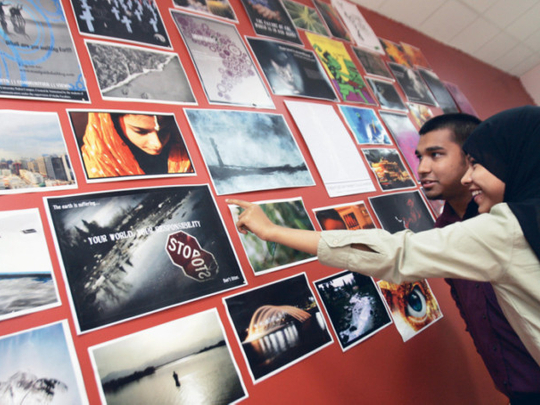
Attracted by an affordable, but quality education that is recognised by employers across the world, many non-resident Indians (NRIs) in the GCC prefer to send their children back home for higher studies. Indian colleges and universities impart relevant skills and knowledge that find resonance in global job markets.
With a wide variety of options, students have plenty to choose from. However, in recent years, to capitalise on the demand for Indian degrees in the Middle East, many top universities have either set up offshore campuses or deployed representatives who regularly participate in education fairs, liaise with career counsellors and meet prospective students.
While engineering, medicine, finance and business courses are the top choices for most students, the demand for courses in law, fashion, mass communication and animation is rising as young people seek courses that will prepare them for the careers of the future.
Technology courses
Indian colleges in the UAE have been quick to respond by introducing courses that didn’t exist even a decade ago. Amity University, a reputed private Indian education institute with a campus at Dubai International Academic City, has introduced bachelor of technology programmes in solar and alternate energy, nanotechnology, nuclear science and aerospace engineering to specifically address the needs of the market.
Also responding to a demand for engineering courses is Manipal University in Dubai. It has launched three new programmes in engineering.
Dr S.V. Kota Reddy, Academic President — Manipal University, Dubai, says, “We have introduced a course in automobile engineering at the undergraduate level and two programmes at the masters level — M.Tech in Digital Electronics and Advanced Communication and M.Tech in Manufacturing Engineering and Technology.”
Electrical and mechanical engineering are always in demand in India. Computer science, electronics, telecommunications and petroleum engineering courses are also showing growth as job opportunities continue to rise.
“Computer science and IT, which seemed to have lost their sheen because of the slowdown in demand for outsourced jobs, are gaining ground once again. They are now being pursued by those who are interested in these areas as more and more technology companies are hiring fresh graduates,” says Rema Menon, Director, Counselling Point Training and Development, a KHDA-licensed counselling centre in Dubai.
Hitherto unheard-of fields are now also emerging as popular choices.
New disciplines
With tourism a major component of the UAE economy, hospitality and travel and tourism management courses have become popular among expatriate students at the undergraduate level.
“Dubai is the strategic hub of choice for leisure and business travellers. With an estimated 500,000 professionals needed over the next five years to meet the human resource requirements of hotels in the UAE, it is no wonder that hospitality programmes rank high on the expat Indian students’ list,” says Mariam Shaikh, Assistant Vice-President, Marketing and Student Recruitment, Amity University.
Amity offers degrees in hotel management and in tourism management. In 2011, Munnar Catering College, which is reportedly India’s largest hospitality training organisation, announced the launch of new hospitality degrees in Ras Al Khaimah, affiliated to India’s Indira Gandhi National Open University. Manipal University, Dubai, announced a new Bachelor of Hotel Management, Travel and Tourism in April this year.
Demand from retail organisations and fashion houses for skilled personnel at various levels has prompted many students to seek out courses in these sectors, such as fashion technology, fashion communication, merchandising and retail management. Programmes in digital media, film-making, interior design and animation are also popular.
But traditional disciplines remain popular, perhaps as young people and their parents aim to build a secure future in what they consider are tried and tested fields. >
Programmes in banking and finance are also popular again, perhaps as a consequence of the uncertain economic times. One new development is the ability to study Chartered Accountancy (CA) straight after high school. “It is no longer mandatory for a student to be a graduate to pursue the CA programme,” says Menon.
Dual streams
“Many students pursue both Bachelor of Commerce (B.Com)/Bachelor of Business Administration (BBA) and Chartered Accountancy (CA) simultaneously, while some focus entirely on CA and opt out of the college after sometime. CA exams being extremely challenging, students are, however, advised to continue their B.Com/BBA so that they have other options after graduation in case they don’t succeed in CA.” As courses from the Association of Chartered Certified Accountants (ACCA) gain popularity in India, this accounting qualification has found favour with some students, Menon adds.
This mirrors a larger trend, says Jayanti Ghose, a career and education consultant based in India. She says students are keen to opt for integrated master’s programmes or dual degree programmes after finishing their 12th standard, especially in the areas of computer applications, business administration, engineering management and the management of pharmaceutical sciences.
“Final-year business and engineering students interested in entering the world of finance can take part-time or certificate programmes offered by National Stock Exchange, BSE Training Institute, National Institute of Securities Market and Indian Institute of Banking and Finance,” she suggests.
Global managers
Also on the rise are management programmes, as executives working in the Gulf aim for better career prospects. Demand for executive MBA programmes is at an all-time high in Indian universities in the UAE, but basic management degrees remain popular.
One recently introduced course is SP Jain’s Business Education 2.0, a tri-city course that allows its students to study in Dubai, Singapore and Sydney. The experience gained through exposure to three different environments aims to enable students to adapt efficiently to a globalised workplace and facilitate a greater understanding of international business.







